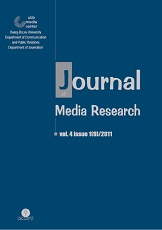The Confrontation of Candidates and Political Doctrines in the 2009 Presidential Campaign
The Confrontation of Candidates and Political Doctrines in the 2009 Presidential Campaign
Author(s): Monica PĂTRUȚSubject(s): Social Sciences
Published by: Accent Publisher
Keywords: election campaign; thematic accord; actional accord; axiological accord; political doctrines
Summary/Abstract: Each election campaign appears like a fight among the aspirants for power and the proposed political platforms. Each candidate attempts to impose the supremacy of his own definition of the political situation and win the symbolic confrontation (Gerstle, 2002). Although the election’s ideological component has lost much of its relevance even in countries with a long democratic tradition (Braud, 1996), on the level of political communication, candidates constantly relate themselves to the party’s doctrine by references to certain topics capable of (re)actuating possible inclinations of the electorate, by hierarchizing political ideas and mobilization in the name of certain values or ideals (Ball & Dagger, 2000). This paper analyses the 2009 Romanian presidential election campaign, starting from the discursive conduct of the second round candidates, Traian Băsescu and Mircea Geoană. We have looked at the way in which the two candidates relate with and/or promote the doctrines of their supporting parties: the Democratic Liberal Party and the Social Democratic Party. In order to outline the theoretical and methodological frame required by the analysis, we have suggested the term of accord to refer to the adequacy/correspondence between the party’s program and that of the supported candidate. The accord will be described by using a mathematical model capable of representing the relations between the two categories of discourse. Approaching the accord between the party’s program and that of the candidate was done from three perspectives: thematic, actional and axiological. Thematically speaking, we are interested in the extent to which the approached topics, the terms and the concepts by means of which the problems are identified in the discourse of the candidate are also found in the discourse of his party. In terms of action, we shall analyze the extent to which the same type of solutions to the same type of problems can be found in the two discourses. Axiologically speaking, we shall emphasize the common values promoted in the discourses of the candidates and political parties involved in the electoral race. We have resorted to content analysis to approach the candidates’ discourses and the parties’ political programs.
Journal: Journal of Media Research - Revista de Studii Media
- Issue Year: 4/2011
- Issue No: 09
- Page Range: 42-51
- Page Count: 10
- Language: English
- Content File-PDF

